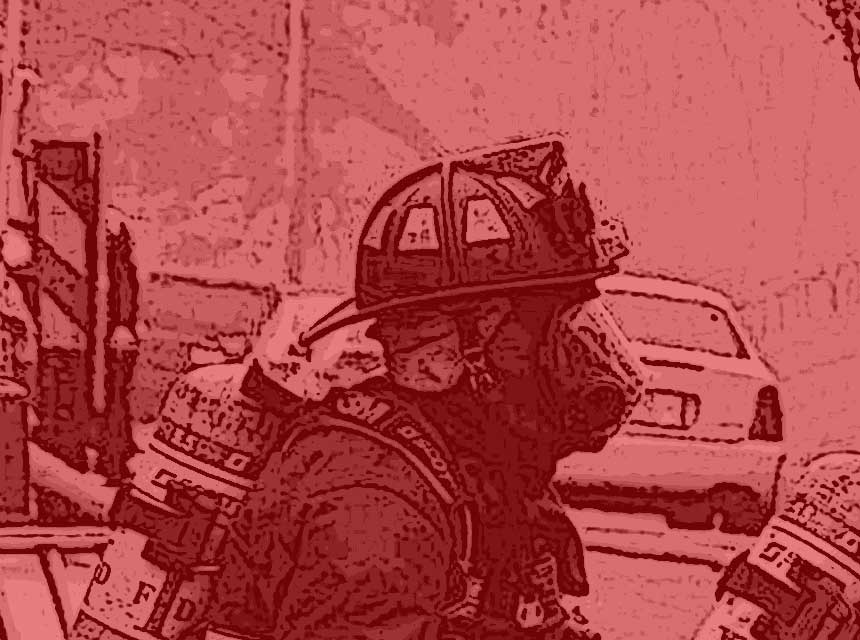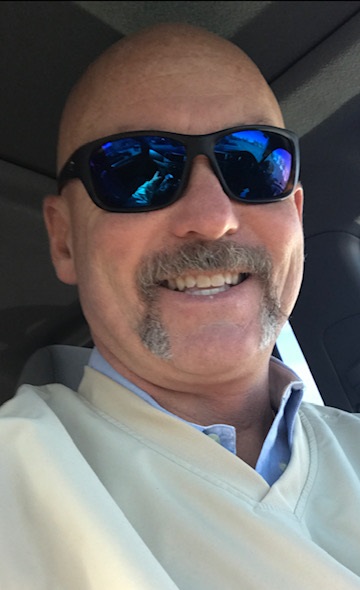
My name is Chris Moore. I am a captain with the Chesapeake (VA) Fire Department (CFD), and I have post-traumatic stress disorder (PTSD). I didn’t have any issues (or so I thought) until early 2017, when I was on a pediatric cardiac arrest call that, unfortunately, was not successful. Within a day of this call, it was as if “Pandora’s Box” had opened up inside me. I started having flashbacks and nightmares from calls I ran more than 12 years ago, calls I never thought twice about. I couldn’t sleep for fear of these haunting nightmares, and I tried to self-medicate with alcohol. Alcohol was my drug of choice that helped by distracting me in the moment, but it was slowly breaking me down inside even more. Slowly but surely, I was withdrawing from my family and friends. I had become so consumed by these new thoughts that they were beginning to take control of me, and I didn’t even realize it.
After three months of struggling with sleep, nightmares, and alcohol, I was at my wits’ end. I was close to being one of those statistics I talked about earlier when I often contemplated suicide. The feelings were so overwhelming that I traveled down a path so dark that I thought there was no way out. I had plans, and even envisioned my demise. No one ever knew, or at least that’s what I thought until a command staff leader in our department noticed a change in me. He, like every good leader, had his finger on the pulse of his people.
RELATED
Living with PTSD: A Wife’s Side of the Story
Paul Combs Poster: Firefighter PTSD and Suicide
Hidden Scars and the Road to Resiliency
After a few personal meetings, I received a lot of wisdom. First and foremost, I was told to believe in my family. Trust them, because they are our biggest support system. For the faith-based readers of this article, follow your faith. I started doing each of these, but something still wasn’t right. I was feeling guilty about past calls, anxious and I was suicidal because I didn’t know or understand what was happening. Most of all, he made me feel not alone. Making someone feel that way is one of the best things you can ever do.
Unike many senior members of the CFD, I wasn’t involved in a line-of-duty death (LODD), nor have I ever had a near-miss, so I felt ashamed. Pride and shame are two of the things that allow the “demons” to take over. Even at the most basic level, this job affects us, but I would not trade it for the world. If all of us processed trauma the same way, dealing with PTSD would be more straight-forward and easy to understand. What affects me may not affect others, and what affects others may not affect me. There is no rhyme or reason to it.
I would never discuss work with my family or friends, nor would tell them some of the things to which we are exposed daily. To me, one of the worst things a person can ask us is, What are some of your worst calls? Why would we want to relive something so bad or horrific? For them, it probably represents the “cool” and “heroic” stuff we do, but I never want to “burst their bubble.” When working, I would be gone for more than 24 hours, come home, and have nothing to say to my wife about my shift other than “it was okay” or it was the “norm.” I thought I was protecting my loved ones when, in reality, I was alienating my best support system.
Looking back over the past few years, I can now see that there were issues related to my PTSD, but it was all hidden in the darkness, slowly spreading within me like a form of cancer. I had become moody, was argumentative with my wife and son, and there was a rift that was starting to widen within our family life. We were all withdrawing and doing our own things quite a bit. Even when we spent time together, there was still tension and a form of loneliness.
Even with all these unexplained feelings and changes, I still didn’t want to believe that anything was wrong. I just kept pushing everything further and further back in my head and tried to make myself believe that everything was or would be okay.
The Definition of “Darkness”
Darkness…what is darkness? According to some uses in the dictionary, it can either mean “The total absence of light,” “Wickedness,” or “Evil.” For me—and at least 30 percent of our first responders—all these definitions apply. How so? Many of us (some without even knowing) suffer from PTSD. Some may have a diagnosis and are seeking help, while others may be misunderstanding what is happening to them. I am a little of both because, although I am getting assistance, I still don’t understand this evil injury. Yes, I say “injury” because that is what PTSD is—an on-the-job injury no different than a sprained ankle or dislocated knee. The thing that makes it so difficult to understand is that others cannot physically see PTSD.
Most adults have some sort of issue that includes, but is not limited to, relationships and finances. First responders have those as well, but when you factor those in with their daily work stressors, traumatic events keep stacking up. The average person may see one to five traumatic events in a lifetime, where some first responders could see that in a month (or even in one shift). Dealing with that over a 10-, 20- or 30-year career without having the proper ways to decompress is a recipe for disaster.
Trauma is cumulative, and the way we handle or don’t handle it can positively or negatively shape our lives. According to the First Responder Behavioral Health Alliance, we are losing more firefighters and other first responders to suicide each year than LODDs; and, this is with only confirmed suicides, which constitutes only about 40 percent of these deaths.
Getting the Help I Needed
In late 2018, after suffering for more than a year, I mentioned to my wife that a friend and mentor in the department gave me a phone number for help. My wife often encouraged me to make that call until I finally did. One day, when I was alone, I picked up the phone and dialed the number. When the voice on the other end answered, I couldn’t speak for what seemed like an eternity (it was more like 15 seconds). I made an appointment, and then I had to do one of the hardest things ever: show up! I am so glad I did.
I learned a lot about myself and what I was experiencing. I was diagnosed with work-related PTSD, and it was explained to me that it doesn’t have to be military related, a LODD, or a near-miss. Mine, like many others, was the cumulative effects of the job. Our heads are like buckets, and when we don’t properly release them, they overfill, which potentially hurts us. This is why we often have adverse reactions to events that seem insignificant. We may know the beginning and middle of our workday, but we don’t always get to know the ending. Not knowing can get the wheels spinning and cause you to start to second-guess and wonder if there was more you could have done.
I continue to go to counseling and therapy almost weekly, and I am getting better. However, I still struggle, battle, and fight each and every day. The journey toward healing takes time, and we must be willing to place blind faith in those closest to us. It is scary that all it takes is a smell, a sight, or a sound, and I can go right back to moments in time. Until recently, only my family and a few close friends knew about this. That is before I started gaining the courage to share my story in hopes of it one day helping others. Slowly but surely I am opening up more and more about my struggles. I have accepted the fact that these feelings are normal, and I am no longer ashamed.
Final Thoughts
I have been living my dream as a firefighter for 27 years, with the last 20 years as a career firefighter. Like many, this is my identity, all I’ve ever known. I know it’s cliché, but I didn’t choose the fire service; it chose me. In our line of work, we are usually called when people are having a crisis. We are always helping others. It’s what we do and what we love. We are always at the ready and on alert, be it on or off duty. Being a firefighter is a profession. However, for most of us, it is a passion and a calling, and we can’t lose sight of the fact that we are still human beings with feelings, where all of our experiences shape who we are as people.
I want to let all our brothers and sisters in the fire service and the first responder and military communities know that IT IS OK TO NOT BE OK!! As much as some of us would still like to believe, we are not superheroes; we are normal human beings with big hearts and that do great things. We do feel pain for ourselves as well as others, and we need to end this stigma now. It is tragic to lose more than 100 members a year to suicide. Together, we can make a difference.
I ask every member keep a finger on the pulse of your brothers and sisters. If you see something, say something. Don’t be so quick to brush things off or even chastise someone. Instead, make time for each other, be a friend, a mentor, or just an ear to listen. Plant these seeds, and they will grow into something positive. People won’t always remember what you said, but they will remember how you make them feel. So, take the time for one another and let your brothers and sisters know that they are not alone.
Firefighters and first responders must believe that they can get help without judgement or penalty. We need to pledge to change the culture in house and among our peers. We are humans with emotions, so it’s time we end the stigma now. Nobody fights alone.

Chris Moore is a captain with the Chesapeake (VA) Fire Department (CFD). He has been featured on The Fire Inside podcast with Jon Sanders and is an advocate for behavioral health. Moore is also a member of the CFD’s Peer Support and Behavioral Health Team and has attended numerous classes and conferences related to behavioral health. He can be reached at cmoore@cityofchesapeake.net.

